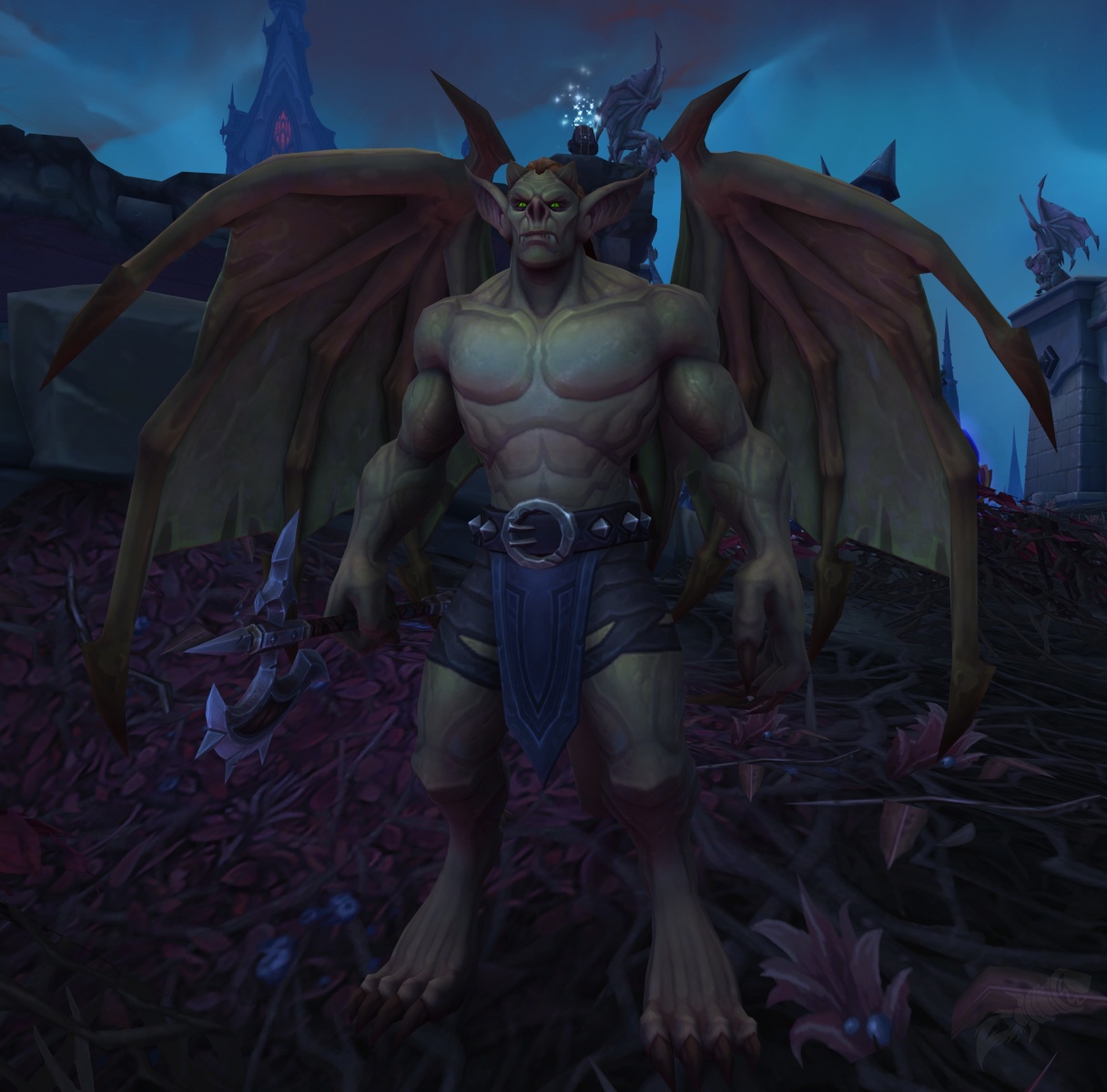will have to respond in more detail on the weekend to a couple of things.
but will keep posting for now.
Relationships with Adventurers
How Gargoyles perceive—and clash with—the classes and peoples who roam their domains
Gargoyles measure other beings not by species, alignment, or creed, but by
how they treat the places that birthed the gargoyles themselves. A gargoyle's loyalty is always to a structure—its stone, its purpose, its history—and thus their relationships with adventurers are shaped by what each class or heritage
does to architecture, memory, and emotional pressure.
Below is how gargoyles generally react to the standard adventuring world.
By Class
Barbarians
Opinion: Wary respect
Gargoyles admire primal passion (strong humors) but dislike uncontrolled destruction. Ruin-born gargoyles especially relate to warriors of instinct.
Conflict Trigger: Barbarians smashing doors, walls, or ancient statuary.
Positive Bonds: “Guardian duos” where the barbarian provides fury and the gargoyle provides discipline.
Bards
Opinion: Deep affection
Bards fill structures with
story,
sound, and
emotional resonance—all things gargoyles feed on. A bard performing in a hall with gargoyles will almost always gain watchers.
Conflict Trigger: Satire or songs mocking the place’s history.
Positive Bonds: Bards can “awaken” dormant gargoyles with powerful performances.
Clerics
Opinion: Reverence to outright devotion
Cathedral-born gargoyles often view clerics as cousins or co-workers. They communicate well through ritual, symbolism, and purpose.
Conflict Trigger: Clerics desecrating rival temples or using radiant powers to obliterate stone undead.
Positive Bonds: Clerics can bless a gargoyle’s stone sleep, speeding healing.
Druids
Opinion: Mutual respect, mild distance
Gargoyles are the “spirits of stone,” which druids acknowledge even if they don’t fully understand. Stone circles may house gargoyle watchers.
Conflict Trigger: Druids reshaping stone or dissolving old buildings to “return it to nature.”
Positive Bonds: Shared respect for ancient places.
Fighters
Opinion: Professional courtesy
Fighters see gargoyles as stalwart allies or brutal obstacles. Gargoyles respect martial discipline.
Conflict Trigger: Fighters breaking into keeps or fortresses.
Positive Bonds: Sparring partners—gargoyles enjoy testing their granite against steel.
Monks
Opinion: Quiet fascination
Monks understand stillness and discipline—two traits gargoyles admire. Stone monasteries often “grow” gargoyles of particularly serene demeanor.
Conflict Trigger: Almost none; monks rarely disrupt architecture.
Positive Bonds: Some monasteries teach forms inspired by gargoyle postures.
Paladins
Opinion: Reverence and instinctive trust
Gargoyles instinctively recognize oaths and divine purpose in paladins.
Conflict Trigger: Unintentional—paladins sometimes believe gargoyles are evil constructs.
Positive Bonds: Paladins who guard a gargoyle’s home gain a lifelong ally.
Rangers
Opinion: Respect, often allied
Rangers who patrol ruins, outposts, or watchtowers may form a “stone-and-flesh” partnership with local gargoyles.
Conflict Trigger: Rangers specializing in “monstrosity slaying.”
Positive Bonds: Rangers who treat abandoned places with reverence are beloved.
Rogues
Opinion: Distrust
Rogues break into places; gargoyles exist to
defend places. Enough said.
Conflict Trigger: Trespassing
Positive Bonds: Rare—except for rogues who protect a neighborhood or district.
Sorcerers
Opinion: Awe mixed with concern
Sorcerers radiate innate emotion—exactly what gargoyles absorb to grow. This makes them fascinating and dangerous.
Conflict Trigger: Wild magic interacting unpredictably with stone.
Positive Bonds: Arcane-blood gargoyles may adopt sorcerers as “warm, moving lodestones.”
Warlocks
Opinion: Deep suspicion
Gargoyles dislike pacts that distort natural emotional resonance. However, some warlocks draw their power from forgotten places, which gargoyles can respect.
Conflict Trigger: Eldritch energies warping stone or sigils.
Positive Bonds: Patrons tied to architecture (Ruin, Memory, Secrets, Vaults) yield strong alliances.
Wizards
Opinion: Intellectual caution
Wizards reshape the world with methodology, which gargoyles admire… until spells start altering stone.
Conflict Trigger: Stone Shape, Transmute Rock, Disintegrate
Positive Bonds: Wizards who treat structures as sacred sites may find gargoyles as research assistants (and test subjects).
By Adventuring Species
Aarakocra & Other Fliers
Gargoyles consider them “air rivals,” especially when territorial around roofs and towers.
Dragonborn
Gargoyles mistrust breath weapons but admire draconic pride and ancient lineage.
Dwarves
Mutual admiration. Dwarves carve stone; gargoyles
are stone. They speak the same geological language.
Elves
Elves maintain elegant architecture with emotional resonance—perfect for gargoyle formation. Many ancient elven citadels host deeply wise, melancholic gargoyles.
Gnomes
Gnomes fascinate gargoyles—especially tinkerers or illusionists who accidentally awaken dormant guardians.
Halflings
Halflings rarely disrupt architecture; gargoyles often treat them as harmless, friendly “little tenants.”
Humans
Gargoyles see humans as
builders and breakers. They can become beloved keepers or hateful despoilers depending on how they treat the gargoyle’s structure.
Orcs
Gargoyles respect physical strength. Ruin-born gargoyles often ally with orcs who have claimed old fortresses.
Tieflings
Tieflings arrive with emotional intensity—an excellent catalyst for gargoyle growth. They’re often welcomed as “living humors.”
Patterns in Gargoyle–Adventurer Interaction
They Respect:
- Builders
- Protectors
- Historians
- Storytellers
- Anyone who leaves a place better than they found it
They Despise:
- Vandals
- Looters
- Tomb robbers
- Adventurers who assume every statue is an enemy
- Spellcasters who reshape stone carelessly
Why They Fight Adventurers
Gargoyles rarely pick fights
simply because they are evil. Instead, conflict typically arises from
territorial instinct,
protective compulsion, or
emotion-hunger.
1. They are Protectors by Design
A gargoyle is sculpted with purpose, and many will fight to protect:
- shrines
- graves
- archives
- ancient vaults
- cursed sites
- wizard laboratories
- abandoned fortresses
Adventurers who intrude into such places activate their drive to
defend the story and memory of the stone.
2. Adventurers Are Emotional Buffets
A cluster of adventurers radiates:
- courage
- fear
- greed
- hope
- anticipation
This emotional “heat” can draw gargoyles like food attracts predators.
Some clans call the adventuring party a
“warm feast” — not because of flesh, but because of
high-quality emotions.
3. Misidentification
Gargoyles “read” emotions, not context.
Adventurers sneaking around, prying open doors, or carrying cursed relics may be interpreted as:
- desecrators
- thieves
- hunger-bearing spirits
- emotional threats
A gargoyle’s instinct is simple:
Stop the disturbance.
4. They Are Guardians of Regimes Long Dead
Many gargoyles still protect:
- tyrants
- demon kings
- forgotten cults
- ancient noble houses
When adventurers come to dismantle old evil, gargoyles may stand in the way out of misplaced loyalty.
Gargoyle Hunting & Combat Tactics
Even CR 2 gargoyles are clever and adaptive; high-CR variants are terrifying.
Stealth & Stillness
Their greatest weapon is
perfect camouflage:
- Freeze in plain sight
- Assume broken poses
- Flatten into bas-relief on walls
- Shatter wings into rubble to appear destroyed
- Stand among other statues to mask numbers
Skilled gargoyles can remain perfectly still for
days.
Vertical Ambush
Classic gargoyle maneuvers:
- silent drop from above
- grapple and lift
- drop prey from lethal height
- glide between rafters to strike and vanish
Low-level parties especially fear the
Grapple → Ascend → Let Go combo.
Pack Pincer Attacks
Gargoyles rarely hunt alone:
- one distracts with noise
- one drops debris
- one silently circles behind
- one waits hidden as a “statue” to jump fleeing victims
Disney’s clan behavior + D&D pack tactics = nightmare fights.
Emotion-Harvest Tactics
Some variants deliberately provoke:
- fear (to feed)
- anger (to energize flame-humor)
- sorrow (ruin-born gargoyles absorb it like wine)
They may stalk adventurers for hours to “ripen” an emotion before striking.
Stone Sleep Defense
If injured beyond comfort:
- a gargoyle may immediately lock into stone sleep
- appearing to be a simple statue
- regenerating rapidly
Parties may think they “won” only for the gargoyle to wake later, hunting them in earnest.
Gargoyle, Fortress-Born Bulwark
CR 6 (2,300 XP)
Medium elemental (gargoyle), lawful neutral
Fortress-Born Bulwarks are the
defensive champions among gargoyle-kind. Sculpted from ramparts and kill-zones, they have the instincts of siege tacticians and the durability of stone walls. When battle begins, they plant themselves between danger and their charge, turning the tide through immovable defense. Their bodies are layered like masonry: slabs of shale, basalt ribs, and reinforced elbows and knuckles meant to break blades.
Where other gargoyles glide or stalk, Bulwarks
hold the line.
Fortress-Born Bulwark
Armor Class 18 (natural armor)
Hit Points 102 (12d8 + 48)
Speed 30 ft., climb 20 ft.
STR 20 (+5)
DEX 12 (+1)
CON 18 (+4)
INT 8 (–1)
WIS 12 (+1)
CHA 7 (–2)
Saving Throws Con +7, Wis +4
Skills Athletics +8, Perception +4
Damage Resistances bludgeoning, piercing, and slashing from nonmagical attacks
Damage Immunities poison
Condition Immunities petrified, poisoned
Senses darkvision 60 ft., tremorsense 20 ft., passive Perception 14
Languages Terran; understands Common but rarely speaks
Challenge 6 (2,300 XP)
Proficiency Bonus +3
Traits
False Appearance (Rampart)
While the gargoyle remains motionless, it is indistinguishable from a section of fortress wall, broken battlement, or carved heraldic support stone. Creatures have disadvantage on Wisdom (Perception) or Intelligence (Investigation) checks to notice its true nature.
Dwarves using Stonecunning ignore this disadvantage.
Siege Frame
The gargoyle deals
double damage to objects and structures.
Bulwark Stance
If the gargoyle has not moved on its turn, it gains:
- +2 AC (already included in the stat block when stationary)
- Advantage on Strength checks and saving throws to resist being moved
- Creatures of its choice within 5 ft gain half cover against ranged attacks
Immovable
The gargoyle has advantage on saving throws against being knocked prone or pushed.
Stone Sleep
When motionless for 1 minute, the gargoyle becomes magically indistinguishable from inanimate stone. While in this state, it regains 10 hit points at the start of its turn and is incapacitated.
Actions
Multiattack
The gargoyle makes two attacks: one with its
Ram and one with its
Hammerfist, or two Hammerfists.
Ram
Melee Weapon Attack: +8 to hit, reach 5 ft., one target.
Hit: 14 (2d8 + 5) bludgeoning damage.
If the gargoyle moved at least 10 ft. straight toward the target beforehand, the target must succeed on a
DC 16 Strength saving throw or be
knocked prone.
Hammerfist
Melee Weapon Attack: +8 to hit, reach 5 ft., one target.
Hit: 11 (2d6 + 5) bludgeoning damage.
Fortification Shock (Recharge 5–6)
The gargoyle slams both fists into the earth or structure it stands upon.
Creatures within 15 feet must make a
DC 15 Constitution saving throw or take:
- 21 (6d6) thunder damage
- Be shoved 10 feet and knocked prone
On a successful save, a creature takes half damage and is not moved.
Nonmagical structures in the area take
double damage.
Reactions
Interposing Block
When a creature within 5 feet is hit by an attack, the gargoyle imposes disadvantage on the attack roll by interposing its armored body. The gargoyle must not be incapacitated.
Tactics
Fortress-Born Bulwarks fight like living strongpoints:
- Begin combat in Bulwark Stance, forcing enemies to come to them.
- Protect casters or leaders with Interposing Block.
- Use Fortification Shock to break up clusters or shatter barricades.
- Coordinate with other gargoyles as the “anchor unit” of a defense.
They are terrifying in sieges, bridge battles, and choke points.
Lore Hooks
Where They Are Found
- Abandoned dwarven citadels
- Haunted strongholds
- Mage war ruins
- Border keeps held for centuries
- Ancient siege sites
- Paladin or knightly fortresses
Adventure Seeds
- A dormant Bulwark awakens during castle renovations.
- A noble family claims their estate’s “guardian gargoyles” have begun selecting who may enter.
- A fortress fallen to undead still has its Bulwark Gargoyles standing watch over the empty keep.



 They just need a noticeable tail. And in the case of the female Stoneborn (who is standing in the foreground in the third pic), wings.
They just need a noticeable tail. And in the case of the female Stoneborn (who is standing in the foreground in the third pic), wings. 
 That would be the icing on the stone cake.
That would be the icing on the stone cake.





